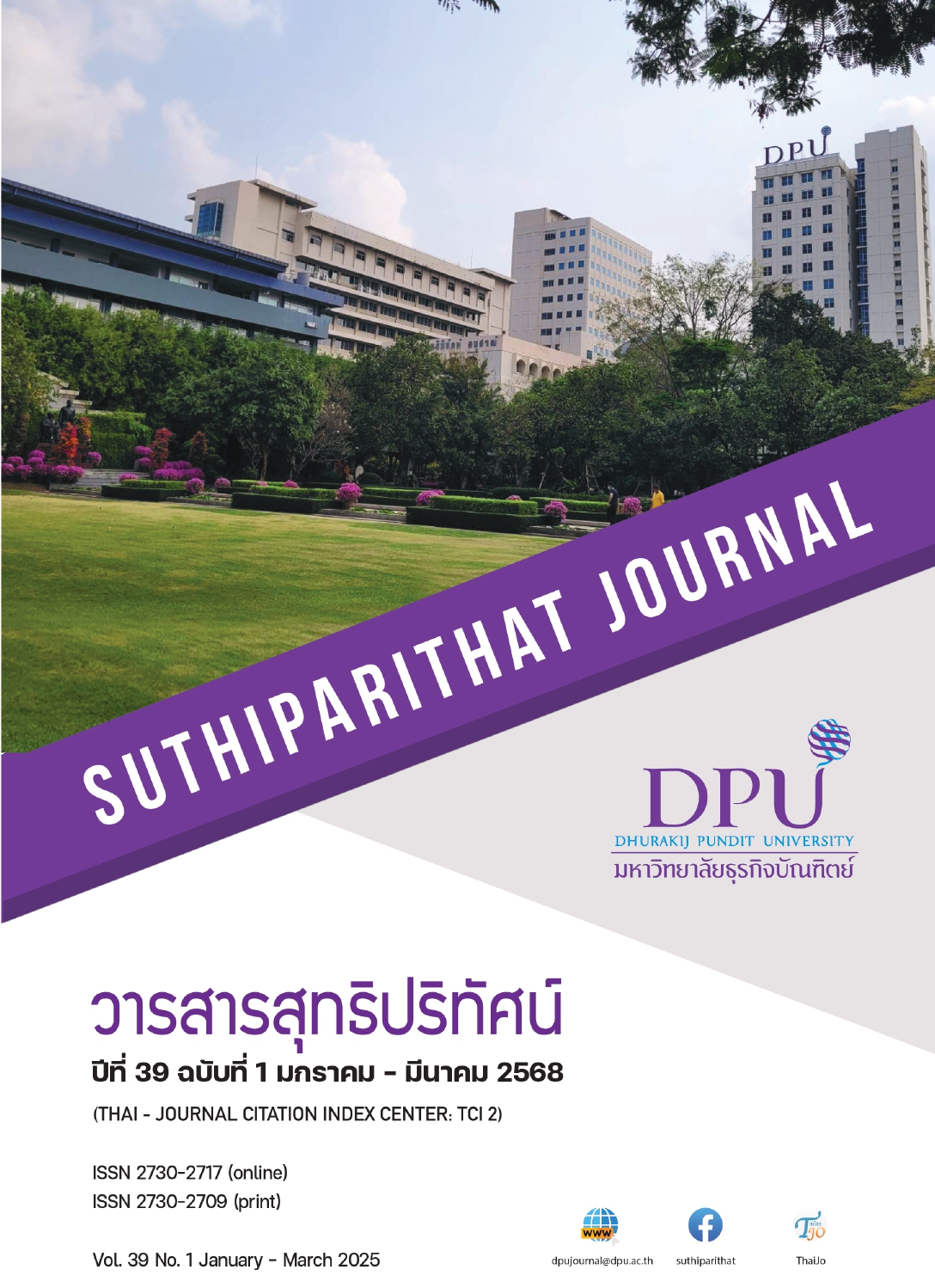Human resource development and achievement motivation affecting work efficiency of state enterprise employees under the Ministry of Transport
Keywords:
Human Resource Development, Achievement Motivation, Work EfficiencyAbstract
This research aimed to 1. compare the work efficiency of employees of a state enterprise under the Ministry of Transport classified by personal factors and 2. study the human resource development and achievement motivation that affect the work efficiency of employees of a state enterprise under the Ministry of Transport. The sample consisted of 403 employees of a state enterprise under the Ministry of Transport. Data were collected by questionnaires. Data were analyzed using descriptive statistics, including frequency, percentage, mean, standard deviation, and inferential statistics to test the research hypotheses, including Independent Samples t-Test, One-Way ANOVA, and multiple regression analysis.
The research results found that employees of a state enterprise under the Ministry of Transport, with personal factors such as different ages, had different work efficiency in terms of volume, time and cost. This reflects that age differences affect work efficiency due to the characteristics of each age group. It was also found that factors such as the need for power, the need for achievement, education and the need for affiliation had a positive effect on work efficiency. The Adjusted R Square value was .592, which could explain 59.20 percent of the variance in work efficiency of employees of a state enterprise under the Ministry of Transport, with a statistical significance. This reflects that employees with the authority to make decisions, control work and have leadership tend to want to achieve work goals. Receiving appropriate education and being accepted by coworkers and supervisors motivates employees to work efficiently. Therefore, the organization should allow employees to have a role in decision-making and assign important tasks to promote self-development.
References
กฤตภาคิน มิ่งโสภา และณกมล จันทร์สม. (2564). แรงจูงใจที่ส่งผลต่อประสิทธิภาพการปฏิบัติงาน. วารสารวิทยาการจัดการปริทัศน์, 23(2), 209–222. https://so03.tci-thaijo.org/index.php/msaru/article/view/254445
กฤตวิทย์ แก้วกำพล, ดารารัตน์ ฉ่ำคร้าม, และจุรีวรรณ จันพลา. (2563). ปัจจัยแรงจูงใจใฝ่สัมฤทธิ์ที่ส่งผลต่อประสิทธิภาพในการปฏิบัติงานของพนักงานการไฟฟ้าส่วนภูมิภาค อำเภอกำแพงแสน จังหวัดนครปฐม. วารสารวิชาการศรีปทุม ชลบุรี, 17(2), 160-169. https://so05.tci-thaijo.org/index.php/SPUCJ/article/view/248792
เกสรา บุญครอบ และภัทรนันท์ สุรชาตรี. (2565). การพัฒนาบุคลากรที่ส่งผลต่อประสิทธิภาพการทำงานของบริษัท มิตซุย พรีซิสชั่นไทย จำกัด. วารสารวิทยาการจัดการปริทัศน์, 24(2), 51-61. https://so03.tci-thaijo.org/index.php/msaru/article/view/260965
ชนิศา หาญสมบุญ และกรเอก กาญจนาโภคิน. (2563). การพัฒนาทรัพยากรมนุษย์ที่ส่งผลต่อประสิทธิภาพการทำงานของบุคลากรการทางพิเศษแห่งประเทศไทย. วารสารศิลปการจัดการ, 4(1), 46-58. https://so02.tci-thaijo.org/index.php/jam/article/view/236946
ณัฏฐ์วัฒน์ ภควันฉัตร, กฤติยา อิศวเรศตระกูล, และวณิศญดา วาจิรัมย์. (2565). การพัฒนาทรัพยากรมนุษย์ที่ส่งผลต่อประสิทธิภาพการปฏิบัติงานในองค์กรของพนักงานภาคเอกชนจังหวัดชลบุรี. วารสารวิจัยมหาวิทยาลัยเวสเทิร์น มนุษยศาสตร์และสังคมศาสตร์, 8(2), 29-38. https://so04.tci-thaijo.org/index.php/WTURJ/article/view/259142
บริษัท ท่าอากาศยานไทย จำกัด (มหาชน). (2567). แบบแสดงรายการข้อมูลประจำปี/รายงานประจำปี 2567. https://investor-th.airportthai.co.th/or.html
ปริศนา ศรีไกร และอภิสิทธิ์ ตั้งเกียรติศิลป์. (2565). อิทธิพลของความคาดหวังในการทำงานและแรงจูงใจใฝ่สัมฤทธิ์ที่ส่งผลต่อประสิทธิภาพในการปฏิบัติงานของพนักงานบริษัทผลิตเครื่องสำอางในเขตกรุงเทพมหานคร. วารสารวิชาการมหาวิทยาลัยปทุมธานี, 13(2), 45-59. https://so05.tci-thaijo.org/index.php/ptujournal/article/view/250921
วิศิษฏ์ แต้ไพบูลย์ และสุรวี ศุนาลัย. (2567). แรงจูงใจและสภาพแวดล้อมการทำงานในยุคปกติถัดไปที่ส่งผลต่อความผูกพันองค์กรของบุคลากรหน่วยงานภาครัฐแห่งหนึ่งในจังหวัดนนทบุรี. วารสารสุทธิปริทัศน์, 38(3), 153-169 https://so05.tci-thaijo.org/index.php/DPUSuthiparithatJournal/article/view/271385
สำนักงานคณะกรรมการนโยบายรัฐวิสาหกิจ. (2567). หลักเกณฑ์การประเมินกระบวนการปฏิบัติงานและการจัดการ Core business enablers ของรัฐวิสาหกิจ (ฉบับปรับปรุง ปี 2567). https://shorturl.asia/P8L5b
สำนักงานคณะกรรมการพัฒนาการเศรษฐกิจและสังคมแห่งชาติ. (ม.ป.ป.). ยุทธศาสตร์ชาติ พ.ศ. 2561-2580 (ฉบับย่อ). https://www.nesdc.go.th/download/document/SAC/NS_SumPlanOct2018.pdf
อัจฉราพรรณ ตั้งจาตุรโสภณ. (2567). ปัจจัยที่มีอิทธิพลต่อการตัดสินใจซื้อรถยนต์ไฟฟ้าของผู้บริโภคในจังหวัดนครราชสีมา. วารสารชุมชนวิจัยและพัฒนาสังคม, 18(4), Article e274731. https://so04.tci-thaijo.org/index.php/NRRU/article/view/274731
เอกสิทธิ์ สนามทอง. (2562). การพัฒนาทรัพยากรมนุษย์: แนวทางพัฒนาสู่ความสำเร็จขององค์การ. วารสารเกษมบัณฑิต, 20(1), 64-77. https://so04.tci-thaijo.org/index.php/jkbu/article/view/190409
McClelland, D. C., Atkinson, J. W., Clark, R. A., & Lowell, E. L. (1975). The achievement motive. Irvington. https://archive.org/details/achievementmotiv0000mccl/page/n7/mode/2up
McClelland, D. C. (1985). Human motivation. Foresman and Company. https://archive.org/details/humanmotivation0000unse/mode/1up
Nadler, L. (1980). Corporate human resources development: A management tool. American Society for Training and Development. https://archive.org/details/corporatehumanre0000nadl_r2x0
Petersen, E., & Plowman, E. G. (1949). Business organization and management (Rev ed.). Richard D. Irwin. https://archive.org/details/in.ernet.dli.2015.84677/page/n365/mode/1up
Downloads
Published
How to Cite
Issue
Section
License
Copyright (c) 2025 Dhurakij Pundit University

This work is licensed under a Creative Commons Attribution-NonCommercial-NoDerivatives 4.0 International License.
Content and information of the article published at Suthiparithat Journal are based on the sole opinions and responsibility of author(s) only. Neither the editorial board involve in......







